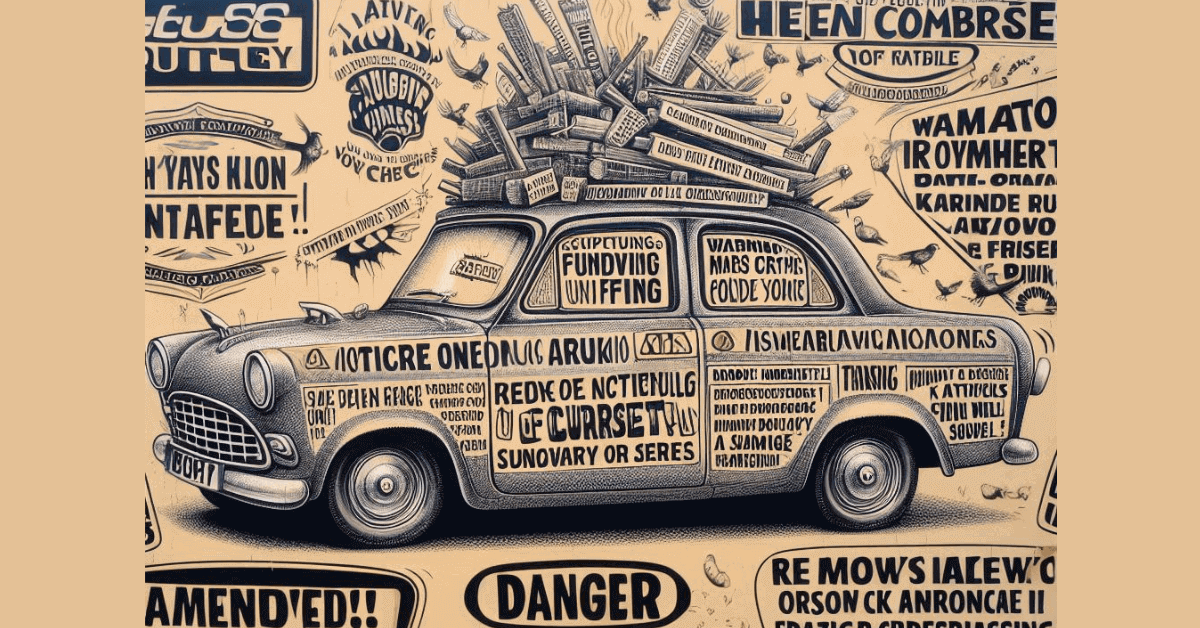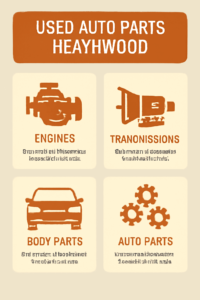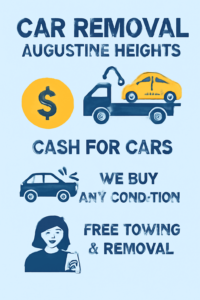Driving a car comes with responsibilities beyond just filling the gas tank and getting regular oil changes. It also involves keeping an eye out for signs that indicate when it might be time to say goodbye to your trusted vehicle. Recognizing these signs early can save you from unexpected breakdowns, costly repairs, and even safety hazards. In this article, we’ll explore the various signs that indicate your car might need removal and what you can do about it.
Strange Noises
One of the most obvious signs that your car might need removal is when it starts making strange noises. These noises can come from various parts of the vehicle and often indicate underlying issues that need attention.
Engine Noises
Unusual sounds coming from the engine, such as knocking, tapping, or whining, could be signs of severe problems like worn-out bearings, damaged pistons, or low oil levels. Ignoring these noises can lead to catastrophic engine failure.
Brake Squealing
If you hear a high-pitched squealing noise when you apply the brakes, it’s likely due to worn brake pads. Continuing to drive with worn brake pads can damage the rotors and compromise your ability to stop safely.
Rattling or Clunking Sounds
Rattling or clunking noises, especially when going over bumps or rough roads, could indicate issues with the suspension or steering components. These issues can affect the handling and stability of your car, increasing the risk of accidents.
Fluid Leaks
Leaking fluids under your car can indicate a variety of problems, from minor leaks to major mechanical failures. It’s essential to identify the type of fluid and address the issue promptly to prevent further damage.
Identifying Different Fluid Leaks
Common fluids that may leak from your car include engine oil, transmission fluid, coolant, and brake fluid. Each type of leak requires specific repairs to prevent damage to vital components.
Consequences of Ignoring Leaks
Ignoring fluid leaks can lead to overheating, engine damage, transmission failure, brake failure, or even fires. Regularly checking for and repairing leaks is crucial for maintaining the health and longevity of your vehicle.
Warning Lights
Modern cars are equipped with warning lights that illuminate to alert drivers to potential problems. Ignoring these warning lights can have severe consequences for both your vehicle and your safety on the road.
- Standard Warning Lights and Their Meanings
Some standard warning lights include the check engine light, oil pressure light, battery light, and ABS light. Each light indicates a specific issue that needs to be addressed promptly to avoid further damage.
- Why They Shouldn’t Be Ignored
While it may be tempting to ignore warning lights, doing so can result in costly repairs or breakdowns at the worst possible time. Ignoring warning lights is like ignoring your car’s cry for help and can lead to more significant problems down the road.
Excessive Smoke
Excessive smoke coming from your car’s exhaust can indicate serious issues with the engine or other components. The colour of the smoke can provide clues as to the nature of the problem.
Types of Smoke and Their Implications
Blue smoke typically indicates burning oil, white smoke suggests a coolant leak and black smoke indicates an overly rich fuel mixture. Each type of smoke requires immediate attention to prevent further damage to the engine.
What to Do If You Notice Excessive Smoke
Suppose you notice excessive smoke coming from your car’s exhaust. In that case, it’s essential to pull over safely and have your vehicle inspected by a qualified mechanic. Continuing to drive with excessive smoke can cause irreparable damage to the engine.
Poor Performance
A noticeable decline in your car’s performance can indicate various underlying issues that need to be addressed. Ignoring these performance issues can lead to further damage and increased repair costs.
Loss of Power
If your car feels sluggish or struggles to accelerate, it could be due to issues such as clogged fuel injectors, a failing fuel pump, or a malfunctioning sensor. Ignoring these issues can result in reduced fuel efficiency and engine damage.
Difficulty Starting the Engine
If your car has trouble starting or requires multiple attempts to turn over, it could be due to a weak battery, faulty starter motor, or fuel system problems. Ignoring these issues can leave you stranded and in need of a tow.
Rough Idling or Stalling
An engine that idles roughly or stalls frequently could have issues with the fuel system, ignition system, or emissions components. These issues can affect the drivability of your car and should be addressed promptly.
Rust and Corrosion
Rust and corrosion are common problems in older vehicles, especially in regions with harsh weather conditions or frequent exposure to road salt. While surface rust may be cosmetic, severe rust can compromise the structural integrity of the vehicle.
Checking for Rust and Corrosion
Inspecting your car regularly for signs of rust and corrosion, especially in areas prone to rusting, such as the undercarriage and wheel wells, can help prevent minor issues from becoming major problems.
How It Affects the Structural Integrity
Severe rust and corrosion can weaken the frame, chassis, and other structural components of your car, making it less safe to drive. Addressing rust issues promptly can help prolong the life of your vehicle and ensure your safety on the road.
Aging and Mileage
As cars age and accumulate mileage, they naturally experience wear and tear on various components. Recognizing the signs of aging and high mileage can help you determine when it’s time to consider replacing your vehicle.
Impact of High Mileage on Car Performance
High mileage can take a toll on your car’s engine, transmission, suspension, and other critical components, leading to reduced performance and reliability. Understanding the effects of high mileage can help you make informed decisions about your vehicle’s future.
Signs of Wear and Tear Due to Aging
Common signs of aging and wear include increased oil consumption, transmission slipping, suspension sagging, and interior deterioration. Addressing these issues promptly can help extend the life of your vehicle and improve its resale value.
Safety Concerns
The condition of your car directly impacts its safety on the road. Driving a vehicle that is in poor condition can put you and others at risk of accidents and injuries.
How Car Condition Affects Safety
Issues such as worn brakes, bald tyres, faulty steering, and non-functioning lights can compromise the safety of your vehicle and increase the likelihood of accidents. Regular maintenance and prompt repairs are essential for keeping your car safe to drive.
Risks of Driving a Deteriorating Vehicle
Continuing to drive a deteriorating vehicle not only puts you at risk but also endangers other road users. It’s essential to address safety issues promptly and consider replacing your car if it can no longer be safely operated.
Costly Repairs
As cars age, they inevitably require more frequent repairs to keep them running smoothly. However, there comes a point when the cost of repairs outweighs the value of the vehicle.
Balancing Repair Costs Against the Value of the Car
When faced with a significant repair bill, it’s essential to consider the age, mileage, and overall condition of your car. In some cases, it may be more cost-effective to invest in a new vehicle rather than pouring money into repairs.
When It’s More Economical to Replace Than Repair
Factors such as the cost of repairs, the resale value of the car, and your budgetary constraints all play a role in determining whether it’s time to replace your vehicle. Consulting with a trusted mechanic can help you make an informed decision.
Environmental Impact
Older cars tend to be less fuel-efficient and produce higher emissions than newer models. Driving an old and inefficient vehicle can have significant environmental consequences.
Pollution Caused by Old and Inefficient Cars
Older cars emit higher levels of greenhouse gases, such as carbon dioxide and nitrogen oxides, as well as harmful pollutants like particulate matter and volatile organic compounds. These emissions contribute to air pollution and climate change.
Benefits of Removing and Recycling Old Vehicles
Removing old and inefficient vehicles from the road through programs like car scrappage schemes can help reduce emissions and improve air quality. Recycling old vehicles also helps conserve valuable resources and reduces the environmental impact of manufacturing new cars.
Options for Removal
When it’s time to say goodbye to your old car, you have several options for disposal, each with its pros and cons.
Selling to Salvage Yards
Salvage yards buy old cars for parts and scrap metal, offering cash in exchange for your vehicle. While this option provides quick cash, you may get less money than you would selling the car privately.
Donating to Charitable Organizations
Donating your old car to a charitable organization can benefit both you and the charity. You get a tax deduction for your donation, and the charity receives funds from selling or auctioning off the vehicle.
Trading in for a New Vehicle
If you’re in the market for a new car, you can trade in your old vehicle at a dealership. While this option is convenient, you may get less money for your old car than you would selling it privately.
Professional Inspection
Regular maintenance checks and inspections by qualified mechanics are essential for keeping your car in good condition and identifying potential issues before they become serious problems.
Importance of Regular Maintenance Checks
Regular oil changes, fluid top-ups, tyre rotations, and other routine maintenance tasks can help prevent breakdowns and extend the life of your vehicle. Following the manufacturer’s recommended maintenance schedule is vital to keeping your car running smoothly.
When to Consult a Mechanic
Suppose you notice any of the signs mentioned in this article or experience any other unusual symptoms with your car. In that case, it’s essential to have it inspected by a qualified mechanic as soon as possible. Ignoring potential issues can lead to costly repairs and safety hazards.
FAQs
Look out for car signs such as strange noises, fluid leaks, warning lights, excessive smoke, poor performance, rust and corrosion, high mileage, and safety concerns.
Is it worth repairing an old car?
It depends on the extent of the damage, the cost of repairs, and the overall condition of the vehicle. In some cases, it may be more economical to replace the car than to repair it.
What should I do with my old car?
You can sell it to a salvage yard, donate it to a charitable organization, trade it in for a new vehicle, or recycle it through a car scrappage scheme.
How often should I have my car inspected by a mechanic?
It’s recommended to have your car inspected by a qualified mechanic at least once a year or whenever you notice any unusual symptoms or warning signs.
Can I drive my car if it’s making strange noises?
It’s not advisable to drive a car that is making strange noises, as it could indicate serious mechanical issues that may lead to a breakdown or an accident.
Conclusion
Recognizing the signs that indicate your car needs removal is essential for ensuring your safety, avoiding costly repairs, and minimizing your environmental impact. By staying vigilant and addressing issues promptly, you can prolong the life of your vehicle and make informed decisions about when it’s time to say goodbye.








